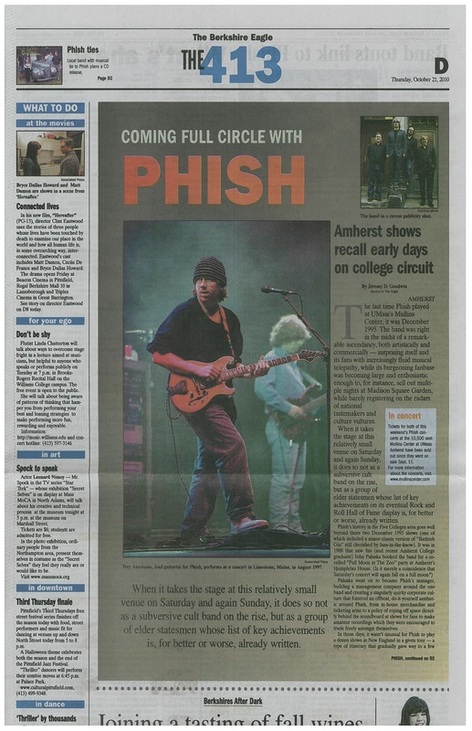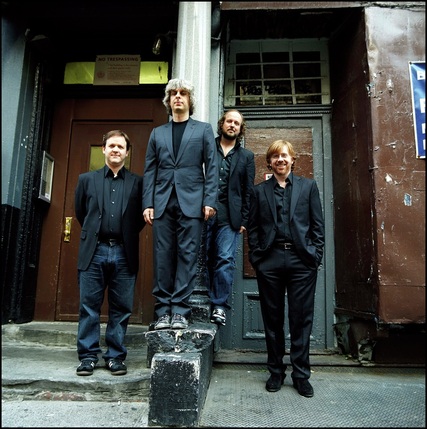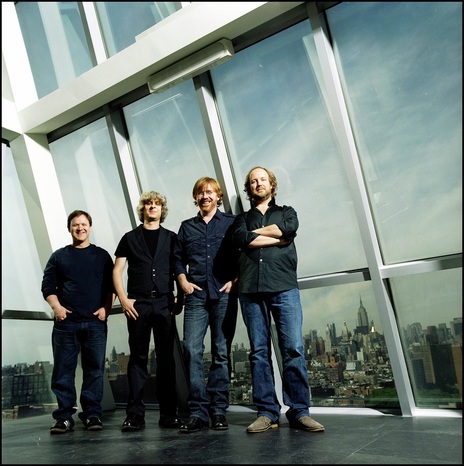Coming full circle with Phish
Published in Berkshire Eagle, 10/21/10

By Jeremy D. Goodwin
AMHERST—The last time Phish played at UMASS's Mullins Center, it was December 1995. The band was right in the midst of a remarkable ascendancy, both artistically and commercially—surprising itself and its fans with increasingly fluid musical telepathy, while its burgeoning fanbase was becoming large and enthusiastic enough to, for instance, sell out multiple nights at Madison Square Garden, while barely registering on the radars of national tastemakers and culture vultures.
When it takes the stage at this relatively small venue on Saturday and again Sunday, it does so not as a subversive cult band on the rise but as a group of elder statesmen whose list of key achievements on its eventual Rock and Roll Hall of Fame display is, for better or worse, already written.
Phish's history in the Five Colleges area goes well beyond those two December 1995 shows (one of which included a minor-classic version of "Bathtub Gin" still cherished by fans-in-the-know). It was in 1988 that new fan (and recent Amherst College graduate) John Paluska booked the band for a so-called “Full Moon at The Zoo” party at Amherst’s Humphries House. (Is it merely a coincidence that Saturday’s concert will again fall on a full moon?) Paluska went on to became Phish’s manager, building a management company around the one band and creating a singularly quirky corporate culture that fostered an offbeat, do-it-yourself aesthetic around Phish, from in-house merchandise and ticketing arms to a policy of roping off space directly behind the soundboard at shows for fans to make amateur recordings which they were encouraged to trade freely amongst themselves.
In those days, it wasn't unusual for Phish to play a dozen shows in New England in a given tour—a type of itinerary that gradually gave way to a few select shows in large markets like Boston, Worcester and Hartford as the band headed down the seaboard and across the country.
Now, Phish is heading down the home stretch of its second year of touring after returning from a five-and-a-half year "breakup" that ended in March 2009. In these comeback years, the band has already played Fenway Park, Hartford, Conn. (four times), Saratoga Performing Arts Center (four times), Darien Center, New York and even Canandaigua, New York.
AMHERST—The last time Phish played at UMASS's Mullins Center, it was December 1995. The band was right in the midst of a remarkable ascendancy, both artistically and commercially—surprising itself and its fans with increasingly fluid musical telepathy, while its burgeoning fanbase was becoming large and enthusiastic enough to, for instance, sell out multiple nights at Madison Square Garden, while barely registering on the radars of national tastemakers and culture vultures.
When it takes the stage at this relatively small venue on Saturday and again Sunday, it does so not as a subversive cult band on the rise but as a group of elder statesmen whose list of key achievements on its eventual Rock and Roll Hall of Fame display is, for better or worse, already written.
Phish's history in the Five Colleges area goes well beyond those two December 1995 shows (one of which included a minor-classic version of "Bathtub Gin" still cherished by fans-in-the-know). It was in 1988 that new fan (and recent Amherst College graduate) John Paluska booked the band for a so-called “Full Moon at The Zoo” party at Amherst’s Humphries House. (Is it merely a coincidence that Saturday’s concert will again fall on a full moon?) Paluska went on to became Phish’s manager, building a management company around the one band and creating a singularly quirky corporate culture that fostered an offbeat, do-it-yourself aesthetic around Phish, from in-house merchandise and ticketing arms to a policy of roping off space directly behind the soundboard at shows for fans to make amateur recordings which they were encouraged to trade freely amongst themselves.
In those days, it wasn't unusual for Phish to play a dozen shows in New England in a given tour—a type of itinerary that gradually gave way to a few select shows in large markets like Boston, Worcester and Hartford as the band headed down the seaboard and across the country.
Now, Phish is heading down the home stretch of its second year of touring after returning from a five-and-a-half year "breakup" that ended in March 2009. In these comeback years, the band has already played Fenway Park, Hartford, Conn. (four times), Saratoga Performing Arts Center (four times), Darien Center, New York and even Canandaigua, New York.

It's now indulging in another Northeast-heavy itinerary, the likes of which haven't been seen in 15 or 20 years. The two nights in Amherst follow shows in Augusta, Maine and Providence, Rhode Island, and precede shows in Manchester, New Hampshire and Atlantic City, New Jersey. (After a break, they wrap up the year with two nights in Worcester and three at what has historically been their New Year's Eve venue of choice, Madison Square Garden.) Many of these venues are the sort the band has long since outgrown. Fans have spilled much digital ink debating online the strategy behind deluging the northeast while leaving fans in other parts of the country bereft of their beloved Phish.
Smaller venues, an autumnal chill in the air, fall tour in the Northeast—in some ways, it can't help but feel nostalgic. And indeed, while the band released a new album upon its comeback last year and has worked a handful of even newer songs into the live rotation in 2010, the bulk of the shows are taken up by relatively straightforward versions of the old musical warhorses of yesteryear.
It feels in some ways like they’ve traveled full circle, and this glut of shows in front of friendly, home-territory fans is a much-deserved victory lap. For the fans who came of age during the band’s lean performance years—including a two-year “hiatus” that preceded the breakup, Phish has spent six of the past ten years in full hibernation, and carried a comparatively light touring schedule even while active—it’s all good. The boys are back, and they’re working through their catalog with a level of musical energy and degree of focus that recalls its days as a hungry band on the college circuit.
Smaller venues, an autumnal chill in the air, fall tour in the Northeast—in some ways, it can't help but feel nostalgic. And indeed, while the band released a new album upon its comeback last year and has worked a handful of even newer songs into the live rotation in 2010, the bulk of the shows are taken up by relatively straightforward versions of the old musical warhorses of yesteryear.
It feels in some ways like they’ve traveled full circle, and this glut of shows in front of friendly, home-territory fans is a much-deserved victory lap. For the fans who came of age during the band’s lean performance years—including a two-year “hiatus” that preceded the breakup, Phish has spent six of the past ten years in full hibernation, and carried a comparatively light touring schedule even while active—it’s all good. The boys are back, and they’re working through their catalog with a level of musical energy and degree of focus that recalls its days as a hungry band on the college circuit.

But one way of looking at “full circle” is to say that the advances of later years have been wiped out. And while the general critical consensus is that Phish, in later years, lost some of the tightness of execution that helped solidify its reputation in the early days, it’s also true that the late 20th century and early 21st century saw improvisational heights that could scarcely have been predicted back at Amherst’s Humphries House. These are heights that the band has only seldom aimed for since coming back from the dead two years ago. The musical priorities are different now.
When Phish played UMASS’s Mullins Center in December 1995, it was not only on a historic hot streak that became glaringly apparent in mid-1993 and lasted, for the most part, into early 1998. It was also at the beginning of a month that would go down among Phish fans as one of the band’s very best. It was a band that was still realizing the extent of its own powers, with its future unwritten.
For the band and its fans, it’s been the excitement of the unknown, rather than the comfort of the familiar, that’s been most exciting. A post-hiatus, post-breakup Phish has the ability to pick one or the other, or combine the two.
So Phish returns this weekend, a legacy act with little left to prove, and a whole new generation of fans just happy to be here. Will the sense of anticipation, of glories yet to be claimed, be as palpable this time as they must have been for some in attendance 15 years ago? Perhaps not.
But there’s no saying that a band coming full circle can’t steer its way into a victory lap.
When Phish played UMASS’s Mullins Center in December 1995, it was not only on a historic hot streak that became glaringly apparent in mid-1993 and lasted, for the most part, into early 1998. It was also at the beginning of a month that would go down among Phish fans as one of the band’s very best. It was a band that was still realizing the extent of its own powers, with its future unwritten.
For the band and its fans, it’s been the excitement of the unknown, rather than the comfort of the familiar, that’s been most exciting. A post-hiatus, post-breakup Phish has the ability to pick one or the other, or combine the two.
So Phish returns this weekend, a legacy act with little left to prove, and a whole new generation of fans just happy to be here. Will the sense of anticipation, of glories yet to be claimed, be as palpable this time as they must have been for some in attendance 15 years ago? Perhaps not.
But there’s no saying that a band coming full circle can’t steer its way into a victory lap.
